Academic and Professional Skills Development: Feedback Analysis
VerifiedAdded on 2020/02/19
|5
|1352
|109
Essay
AI Summary
This essay analyzes the role and significance of feedback in the context of academic and professional skills development. It explores how feedback, whether from teachers, peers, or self-assessment, influences student learning, motivation, and performance. The paper discusses the various aspects of feedback, including its power to shape students' understanding of their work, its effectiveness in guiding them toward improvement, and its implications for their future academic and professional endeavors. It highlights the importance of different feedback methods, such as peer feedback and assessment feedback, and emphasizes the value of providing explanatory feedback over simply providing correct answers. The essay concludes that feedback is a vital component of the teaching and learning process, with the potential to positively impact students' academic achievements and career prospects, provided it is delivered and received thoughtfully.
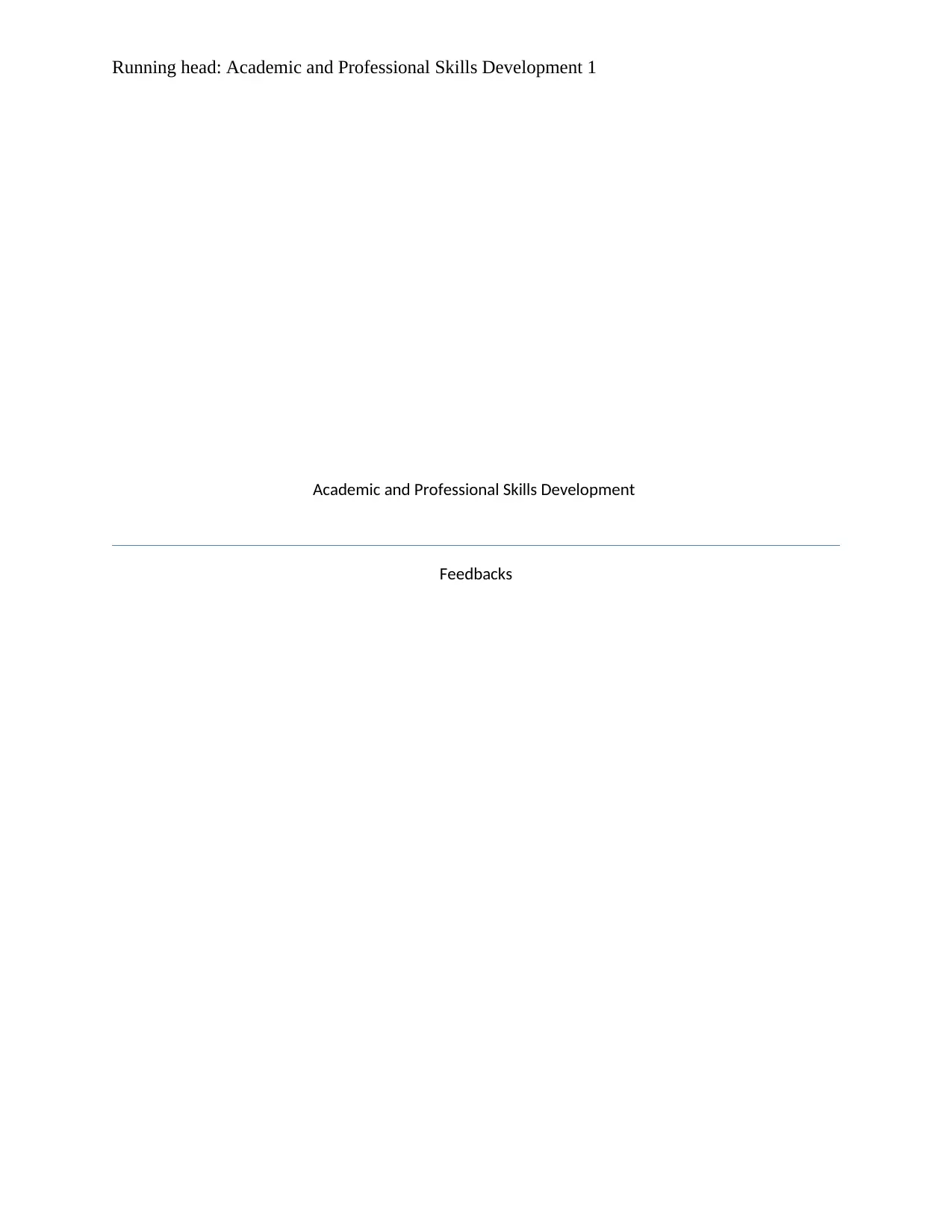
Running head: Academic and Professional Skills Development 1
Academic and Professional Skills Development
Feedbacks
Academic and Professional Skills Development
Feedbacks
Paraphrase This Document
Need a fresh take? Get an instant paraphrase of this document with our AI Paraphraser
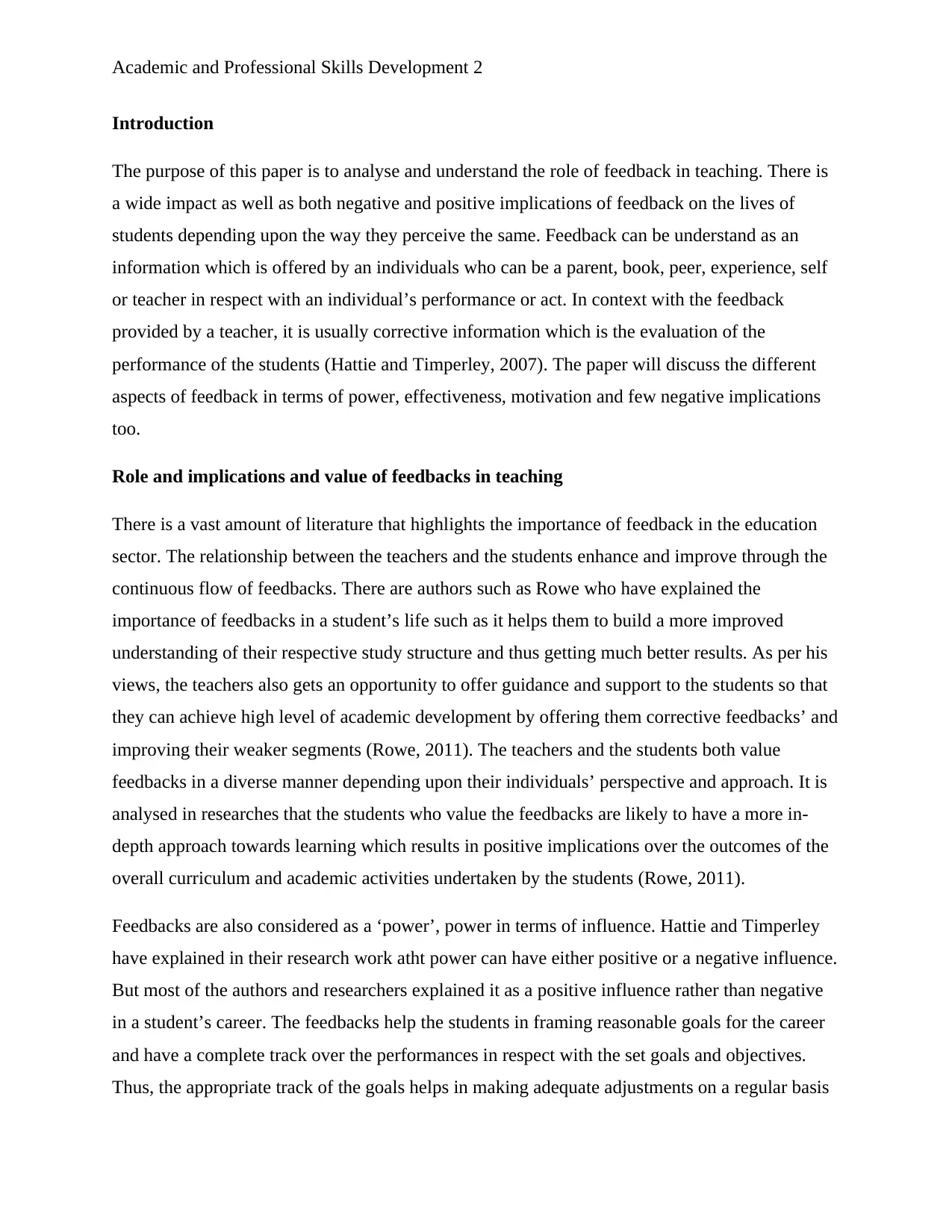
Academic and Professional Skills Development 2
Introduction
The purpose of this paper is to analyse and understand the role of feedback in teaching. There is
a wide impact as well as both negative and positive implications of feedback on the lives of
students depending upon the way they perceive the same. Feedback can be understand as an
information which is offered by an individuals who can be a parent, book, peer, experience, self
or teacher in respect with an individual’s performance or act. In context with the feedback
provided by a teacher, it is usually corrective information which is the evaluation of the
performance of the students (Hattie and Timperley, 2007). The paper will discuss the different
aspects of feedback in terms of power, effectiveness, motivation and few negative implications
too.
Role and implications and value of feedbacks in teaching
There is a vast amount of literature that highlights the importance of feedback in the education
sector. The relationship between the teachers and the students enhance and improve through the
continuous flow of feedbacks. There are authors such as Rowe who have explained the
importance of feedbacks in a student’s life such as it helps them to build a more improved
understanding of their respective study structure and thus getting much better results. As per his
views, the teachers also gets an opportunity to offer guidance and support to the students so that
they can achieve high level of academic development by offering them corrective feedbacks’ and
improving their weaker segments (Rowe, 2011). The teachers and the students both value
feedbacks in a diverse manner depending upon their individuals’ perspective and approach. It is
analysed in researches that the students who value the feedbacks are likely to have a more in-
depth approach towards learning which results in positive implications over the outcomes of the
overall curriculum and academic activities undertaken by the students (Rowe, 2011).
Feedbacks are also considered as a ‘power’, power in terms of influence. Hattie and Timperley
have explained in their research work atht power can have either positive or a negative influence.
But most of the authors and researchers explained it as a positive influence rather than negative
in a student’s career. The feedbacks help the students in framing reasonable goals for the career
and have a complete track over the performances in respect with the set goals and objectives.
Thus, the appropriate track of the goals helps in making adequate adjustments on a regular basis
Introduction
The purpose of this paper is to analyse and understand the role of feedback in teaching. There is
a wide impact as well as both negative and positive implications of feedback on the lives of
students depending upon the way they perceive the same. Feedback can be understand as an
information which is offered by an individuals who can be a parent, book, peer, experience, self
or teacher in respect with an individual’s performance or act. In context with the feedback
provided by a teacher, it is usually corrective information which is the evaluation of the
performance of the students (Hattie and Timperley, 2007). The paper will discuss the different
aspects of feedback in terms of power, effectiveness, motivation and few negative implications
too.
Role and implications and value of feedbacks in teaching
There is a vast amount of literature that highlights the importance of feedback in the education
sector. The relationship between the teachers and the students enhance and improve through the
continuous flow of feedbacks. There are authors such as Rowe who have explained the
importance of feedbacks in a student’s life such as it helps them to build a more improved
understanding of their respective study structure and thus getting much better results. As per his
views, the teachers also gets an opportunity to offer guidance and support to the students so that
they can achieve high level of academic development by offering them corrective feedbacks’ and
improving their weaker segments (Rowe, 2011). The teachers and the students both value
feedbacks in a diverse manner depending upon their individuals’ perspective and approach. It is
analysed in researches that the students who value the feedbacks are likely to have a more in-
depth approach towards learning which results in positive implications over the outcomes of the
overall curriculum and academic activities undertaken by the students (Rowe, 2011).
Feedbacks are also considered as a ‘power’, power in terms of influence. Hattie and Timperley
have explained in their research work atht power can have either positive or a negative influence.
But most of the authors and researchers explained it as a positive influence rather than negative
in a student’s career. The feedbacks help the students in framing reasonable goals for the career
and have a complete track over the performances in respect with the set goals and objectives.
Thus, the appropriate track of the goals helps in making adequate adjustments on a regular basis
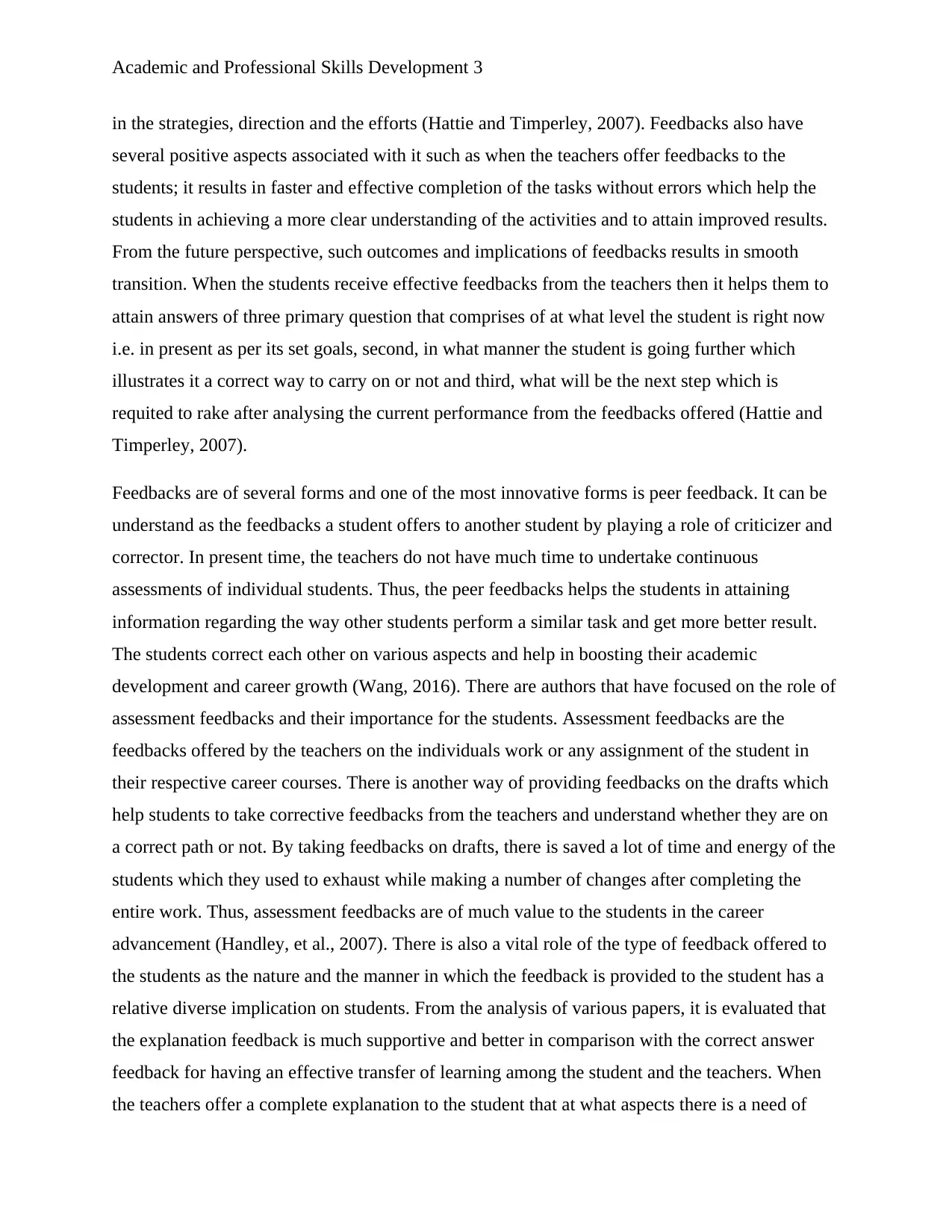
Academic and Professional Skills Development 3
in the strategies, direction and the efforts (Hattie and Timperley, 2007). Feedbacks also have
several positive aspects associated with it such as when the teachers offer feedbacks to the
students; it results in faster and effective completion of the tasks without errors which help the
students in achieving a more clear understanding of the activities and to attain improved results.
From the future perspective, such outcomes and implications of feedbacks results in smooth
transition. When the students receive effective feedbacks from the teachers then it helps them to
attain answers of three primary question that comprises of at what level the student is right now
i.e. in present as per its set goals, second, in what manner the student is going further which
illustrates it a correct way to carry on or not and third, what will be the next step which is
requited to rake after analysing the current performance from the feedbacks offered (Hattie and
Timperley, 2007).
Feedbacks are of several forms and one of the most innovative forms is peer feedback. It can be
understand as the feedbacks a student offers to another student by playing a role of criticizer and
corrector. In present time, the teachers do not have much time to undertake continuous
assessments of individual students. Thus, the peer feedbacks helps the students in attaining
information regarding the way other students perform a similar task and get more better result.
The students correct each other on various aspects and help in boosting their academic
development and career growth (Wang, 2016). There are authors that have focused on the role of
assessment feedbacks and their importance for the students. Assessment feedbacks are the
feedbacks offered by the teachers on the individuals work or any assignment of the student in
their respective career courses. There is another way of providing feedbacks on the drafts which
help students to take corrective feedbacks from the teachers and understand whether they are on
a correct path or not. By taking feedbacks on drafts, there is saved a lot of time and energy of the
students which they used to exhaust while making a number of changes after completing the
entire work. Thus, assessment feedbacks are of much value to the students in the career
advancement (Handley, et al., 2007). There is also a vital role of the type of feedback offered to
the students as the nature and the manner in which the feedback is provided to the student has a
relative diverse implication on students. From the analysis of various papers, it is evaluated that
the explanation feedback is much supportive and better in comparison with the correct answer
feedback for having an effective transfer of learning among the student and the teachers. When
the teachers offer a complete explanation to the student that at what aspects there is a need of
in the strategies, direction and the efforts (Hattie and Timperley, 2007). Feedbacks also have
several positive aspects associated with it such as when the teachers offer feedbacks to the
students; it results in faster and effective completion of the tasks without errors which help the
students in achieving a more clear understanding of the activities and to attain improved results.
From the future perspective, such outcomes and implications of feedbacks results in smooth
transition. When the students receive effective feedbacks from the teachers then it helps them to
attain answers of three primary question that comprises of at what level the student is right now
i.e. in present as per its set goals, second, in what manner the student is going further which
illustrates it a correct way to carry on or not and third, what will be the next step which is
requited to rake after analysing the current performance from the feedbacks offered (Hattie and
Timperley, 2007).
Feedbacks are of several forms and one of the most innovative forms is peer feedback. It can be
understand as the feedbacks a student offers to another student by playing a role of criticizer and
corrector. In present time, the teachers do not have much time to undertake continuous
assessments of individual students. Thus, the peer feedbacks helps the students in attaining
information regarding the way other students perform a similar task and get more better result.
The students correct each other on various aspects and help in boosting their academic
development and career growth (Wang, 2016). There are authors that have focused on the role of
assessment feedbacks and their importance for the students. Assessment feedbacks are the
feedbacks offered by the teachers on the individuals work or any assignment of the student in
their respective career courses. There is another way of providing feedbacks on the drafts which
help students to take corrective feedbacks from the teachers and understand whether they are on
a correct path or not. By taking feedbacks on drafts, there is saved a lot of time and energy of the
students which they used to exhaust while making a number of changes after completing the
entire work. Thus, assessment feedbacks are of much value to the students in the career
advancement (Handley, et al., 2007). There is also a vital role of the type of feedback offered to
the students as the nature and the manner in which the feedback is provided to the student has a
relative diverse implication on students. From the analysis of various papers, it is evaluated that
the explanation feedback is much supportive and better in comparison with the correct answer
feedback for having an effective transfer of learning among the student and the teachers. When
the teachers offer a complete explanation to the student that at what aspects there is a need of
⊘ This is a preview!⊘
Do you want full access?
Subscribe today to unlock all pages.

Trusted by 1+ million students worldwide
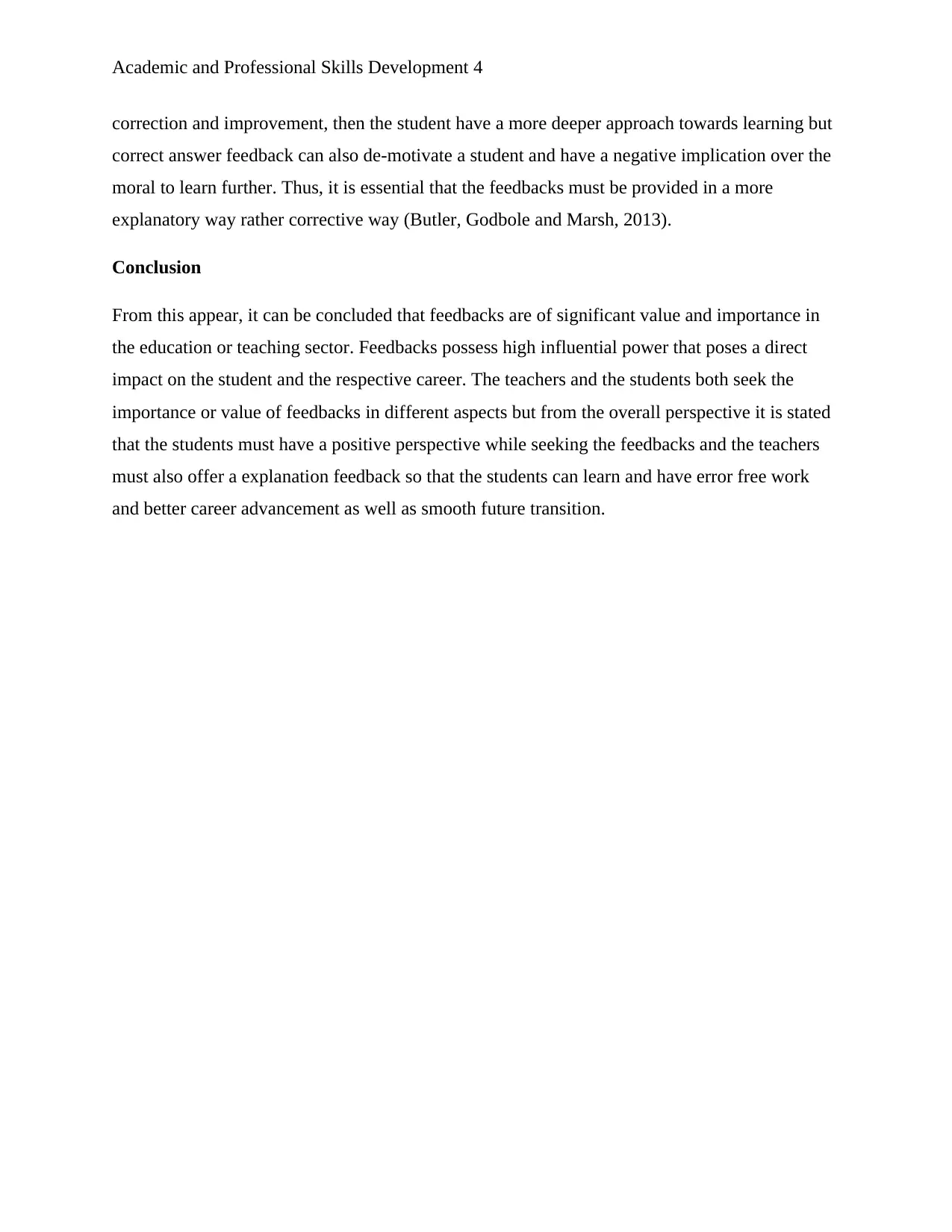
Academic and Professional Skills Development 4
correction and improvement, then the student have a more deeper approach towards learning but
correct answer feedback can also de-motivate a student and have a negative implication over the
moral to learn further. Thus, it is essential that the feedbacks must be provided in a more
explanatory way rather corrective way (Butler, Godbole and Marsh, 2013).
Conclusion
From this appear, it can be concluded that feedbacks are of significant value and importance in
the education or teaching sector. Feedbacks possess high influential power that poses a direct
impact on the student and the respective career. The teachers and the students both seek the
importance or value of feedbacks in different aspects but from the overall perspective it is stated
that the students must have a positive perspective while seeking the feedbacks and the teachers
must also offer a explanation feedback so that the students can learn and have error free work
and better career advancement as well as smooth future transition.
correction and improvement, then the student have a more deeper approach towards learning but
correct answer feedback can also de-motivate a student and have a negative implication over the
moral to learn further. Thus, it is essential that the feedbacks must be provided in a more
explanatory way rather corrective way (Butler, Godbole and Marsh, 2013).
Conclusion
From this appear, it can be concluded that feedbacks are of significant value and importance in
the education or teaching sector. Feedbacks possess high influential power that poses a direct
impact on the student and the respective career. The teachers and the students both seek the
importance or value of feedbacks in different aspects but from the overall perspective it is stated
that the students must have a positive perspective while seeking the feedbacks and the teachers
must also offer a explanation feedback so that the students can learn and have error free work
and better career advancement as well as smooth future transition.
Paraphrase This Document
Need a fresh take? Get an instant paraphrase of this document with our AI Paraphraser
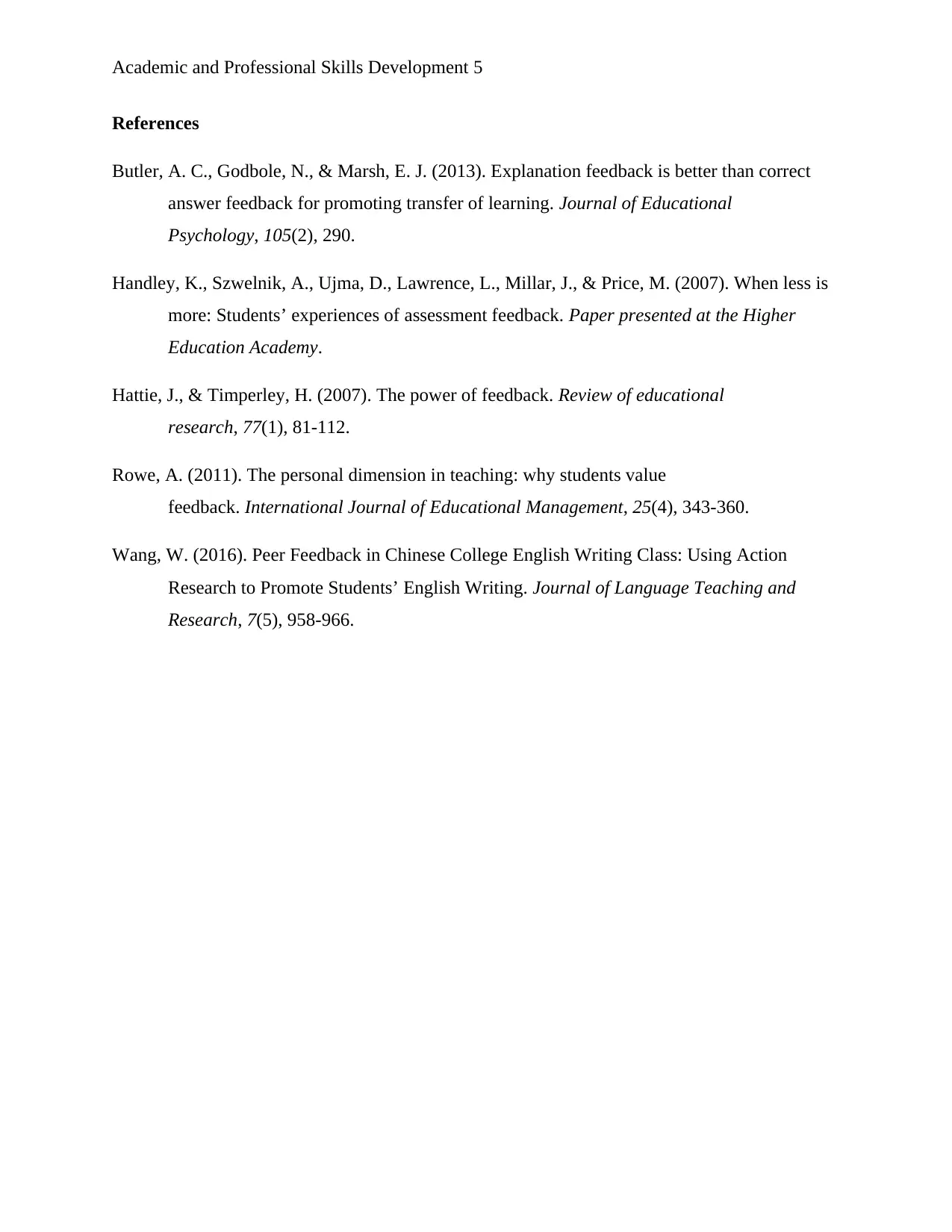
Academic and Professional Skills Development 5
References
Butler, A. C., Godbole, N., & Marsh, E. J. (2013). Explanation feedback is better than correct
answer feedback for promoting transfer of learning. Journal of Educational
Psychology, 105(2), 290.
Handley, K., Szwelnik, A., Ujma, D., Lawrence, L., Millar, J., & Price, M. (2007). When less is
more: Students’ experiences of assessment feedback. Paper presented at the Higher
Education Academy.
Hattie, J., & Timperley, H. (2007). The power of feedback. Review of educational
research, 77(1), 81-112.
Rowe, A. (2011). The personal dimension in teaching: why students value
feedback. International Journal of Educational Management, 25(4), 343-360.
Wang, W. (2016). Peer Feedback in Chinese College English Writing Class: Using Action
Research to Promote Students’ English Writing. Journal of Language Teaching and
Research, 7(5), 958-966.
References
Butler, A. C., Godbole, N., & Marsh, E. J. (2013). Explanation feedback is better than correct
answer feedback for promoting transfer of learning. Journal of Educational
Psychology, 105(2), 290.
Handley, K., Szwelnik, A., Ujma, D., Lawrence, L., Millar, J., & Price, M. (2007). When less is
more: Students’ experiences of assessment feedback. Paper presented at the Higher
Education Academy.
Hattie, J., & Timperley, H. (2007). The power of feedback. Review of educational
research, 77(1), 81-112.
Rowe, A. (2011). The personal dimension in teaching: why students value
feedback. International Journal of Educational Management, 25(4), 343-360.
Wang, W. (2016). Peer Feedback in Chinese College English Writing Class: Using Action
Research to Promote Students’ English Writing. Journal of Language Teaching and
Research, 7(5), 958-966.
1 out of 5
Related Documents
Your All-in-One AI-Powered Toolkit for Academic Success.
+13062052269
info@desklib.com
Available 24*7 on WhatsApp / Email
![[object Object]](/_next/static/media/star-bottom.7253800d.svg)
Unlock your academic potential
Copyright © 2020–2026 A2Z Services. All Rights Reserved. Developed and managed by ZUCOL.




